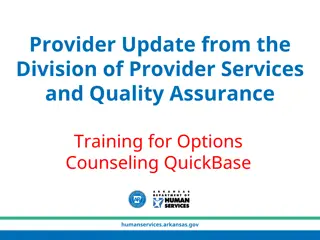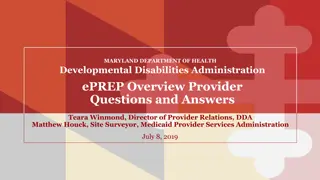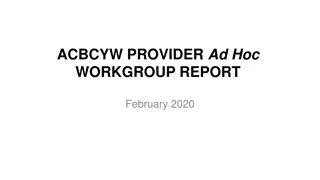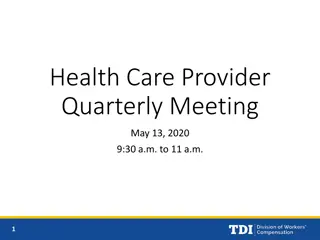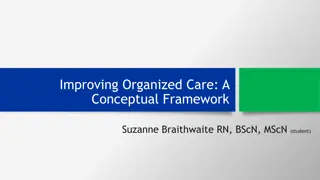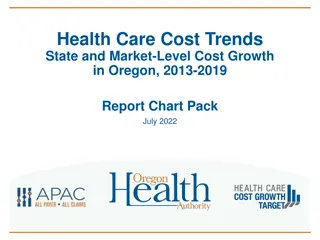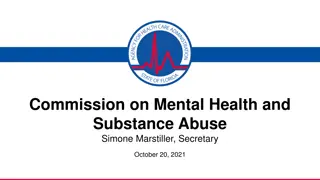Massachusetts Health Care System Provider Quality Focus Chart Book
This chart book focuses on the performance of the Massachusetts health care system in terms of provider quality metrics such as hospital performance scores, patient safety, communication, medication management, and patient experience. It covers various aspects including surgical procedures, readmission rates, chronic condition management, preventive screenings, and nursing home care. The data spans from 2011 to 2013, showing improvements in certain areas like urinary catheter removal and highlighting opportunities for further enhancement in others. The report provides insights into the overall quality of care provided by hospitals, medical groups, and nursing homes in Massachusetts.
Download Presentation

Please find below an Image/Link to download the presentation.
The content on the website is provided AS IS for your information and personal use only. It may not be sold, licensed, or shared on other websites without obtaining consent from the author.If you encounter any issues during the download, it is possible that the publisher has removed the file from their server.
You are allowed to download the files provided on this website for personal or commercial use, subject to the condition that they are used lawfully. All files are the property of their respective owners.
The content on the website is provided AS IS for your information and personal use only. It may not be sold, licensed, or shared on other websites without obtaining consent from the author.
E N D
Presentation Transcript
PERFORMANCE OF THE MASSACHUSETTS HEALTH CARE SYSTEM SERIES: A FOCUS ON PROVIDER QUALITY JANUARY 2015 Chart Book
List of Figures (1) (2) (3) (4) (5) (6) (7) (8) (9) (10) (11) (12) (13) (14) (15) (16) (17) (18) (19) (20) (21) Distribution of Hospital Performance Scores: Urinary Catheter Removed within 2 Days of Surgery 30-Day All-Cause Hospital-Wide Unplanned Readmission Rate Medicare FFS, Ages 65+ 30-Day All-Cause Hospital-Wide Unplanned Readmission Rate All Payer, Ages 18+ Distribution of Hospital Scores: Patient Safety Composite (PSI 90) Distribution of Hospital Scores: Computerized Physician Order Entry Distribution of Hospital Rates: Early Elective Deliveries Patients Who Reported that Doctors Always Communicated Well, by Hospital System Distribution of Hospital Scores: Patients Who Reported They Received Discharge Information Patients Who Reported Area Around Room was Always Quiet, by Hospital System Use of Imaging for Low Back Pain, by Network Distribution of Medical Group Scores: Management of Chronic Conditions Distribution of Medical Group Scores: Medication Management Among Patients with Chronic Conditions Distribution of Medical Group Scores: Recommended Preventive Screenings Administered Distribution of Medical Group Scores: Adult Patient Experience Distribution of Pediatric Medical Group Scores: Adolescent Well Care Visits, Age 12-21 Distribution of Pediatric Medical Group Scores: Follow-up for Children Prescribed ADHD Medication Distribution of Pediatric Medical Group Scores: Appropriate Testing for Pharyngitis Distribution of Pediatric Medical Group Scores: Pediatric Patient Experience Home Health Cases with an Admission to the Hospital Within 60 Days Long-Stay Residents Who Self-Reported Moderate or Severe Pain Distribution of Nursing Home Scores: Long-Stay Residents With Pressure Ulcers
Distribution of Hospital Performance Scores: Urinary Catheter Removed within 2 Days of Surgery Between 2011 and 2013, variation between the highest and lowest performing hospitals on timely catheter removal decreased by 14 percentage points. Source:CMS Hospital Compare | Note: All Payer, Age 18+
30-Day All-Cause Hospital-Wide Unplanned Readmission Rate Medicare FFS, Ages 65+ About 79% of Massachusetts acute hospitals had a risk-adjusted readmission rate for Medicare FFS patients (65+) that was equal to or better than the national average of 16%. Source:CMS Hospital Compare | Note: Medicare FFS only, Age 65+
30-Day All-Cause Hospital-Wide Unplanned Readmission Rate All Payer, Ages 18+ The readmission rates for the all-payer readmission measure are lower than the Medicare Fee-for-Service measure due to the inclusion of patients ages 18 to 64, who have lower readmission rates. Source:CHIA Hospital Discharge Database | Note: All Payers, Age 18+, Rates are preliminary
Distribution of Hospital Scores: Patient Safety Composite (PSI 90) The Massachusetts state average declined by 18 percentage points over three years. Source:CHIA Hospital Discharge Database | Note: All Payers, Age 18+
Distribution of Hospital Scores: Computerized Physician Order Entry In 2013, over two-thirds of Massachusetts hospitals were able to enter between 75% and 100% of their medication orders electronically. Source:The Leapfrog Group | Note: All Payers, All Ages
Distribution of Hospital Rates: Early Elective Deliveries Massachusetts has made impressive strides in reducing early elective deliveries. Source:The Leapfrog Group | Note: All Payers, All Ages
Patients Who Reported that Doctors Always Communicated Well, by Hospital System Across hospital systems, there was little variation in patient ratings of communication with their doctors. Source:CMS Hospital Compare | Note: All Payers, Age 18+
Distribution of Hospital Scores: Patients Who Reported They Received Discharge Information Massachusetts hospitals scored highest among patient experience measures on this dimension of care. Source:CMS Hospital Compare | Note: All Payers, Age 18+
Patients Who Reported Area Around Room was Always Quiet, by Hospital System Only six hospitals in the Commonwealth exceeded the national average on the measure of the area around patients rooms being quiet at night. Four of the six were system-affiliated hospitals. Source:CMS Hospital Compare | Note: All Payers, Age 18+
Use of Imaging for Low Back Pain, by Network Massachusetts medical groups are just below the 90th percentile nationally on appropriate use of imaging studies for low back pain. Source:Massachusetts Health Quality Partners | Note: Commercial HMO/POS members, Age 18+
Distribution of Medical Group Scores: Management of Chronic Conditions Massachusetts met or exceeded the national 90th percentile on all four chronic care management measures included in this report. Source:Massachusetts Health Quality Partners | Note: Commercial HMO/POS members, Age 18+
Distribution of Medical Group Scores: Medication Management Among Patients with Chronic Conditions Lower scores on management of patients on continuing antidepressants point to the need for further integration of primary care and behavioral health. Source:Massachusetts Health Quality Partners | Note: Commercial HMO/POS members, Age 18+
Distribution of Medical Group Scores: Recommended Preventive Screenings Administered Even for cervical cancer, the highest-scoring screening measure, some Massachusetts medical groups screen less than 80% of at-risk patients. Still, most Massachusetts medical groups outperform the national 90th percentile. Source:Massachusetts Health Quality Partners | Note: Commercial HMO/POS members, Age 18+
Distribution of Medical Group Scores: Adult Patient Experience Patients are satisfied with communication with their doctor, but access to care is seen by patients as the least satisfying aspect of the primary care experience. Source:Massachusetts Health Quality Partners | Note: Commercial HMO/POS members, Age 18+
Distribution of Pediatric Medical Group Scores: Adolescent Well Care Visits, Age 12-21 Pediatricians outperform the nation on wellness visits for all ages of children. Scores for adolescent visits are comparatively low relative to other age groups, possibly reflecting the unique challenges of adolescent care. Source:Massachusetts Health Quality Partners | Note: Commercial HMO/POS members, Age 12-21
Distribution of Pediatric Medical Group Scores: Follow-up for Children Prescribed ADHD Medication Although ADHD medication follow up care was the lowest of the clinical scores, about half of Massachusetts medical groups outperform the national 90th percentile. Source:Massachusetts Health Quality Partners | Note: Commercial HMO/POS members, Age 6-12
Distribution of Pediatric Medical Group Scores: Appropriate Testing for Pharyngitis Despite a small number of lower-scoring providers, about three-quarters of Massachusetts medical groups exceeded the national 90th percentile. Source:Massachusetts Health Quality Partners | Note: Commercial HMO/POS members, Age 2-18
Distribution of Pediatric Medical Group Scores: Pediatric Patient Experience As with adult measures, parents and caregivers were pleased with communications with their child s doctor, but access to care is less satisfying. Source:Massachusetts Health Quality Partners Note: Commercial HMO/POS members, Age 17 and under
Home Health Cases with an Admission to the Hospital Within 60 Days While the Massachusetts mean has held steady, the national rate of hospital admissions has dropped slightly. Source:CMS Home Health Compare | Note:Medicare only, All Ages
Long-Stay Residents Who Self-Reported Moderate or Severe Pain The number of nursing homes with high proportions of patients reporting pain has dropped since 2011. Source:CMS Nursing Home Compare | Note:All Payer, All Ages
Distribution of Nursing Home Scores: Long-Stay Residents With Pressure Ulcers The Massachusetts median held steady between 2012 and 2013, a slight improvement over 2011 performance. Source:CMS Nursing Home Compare | Note:All Payer, All Ages





